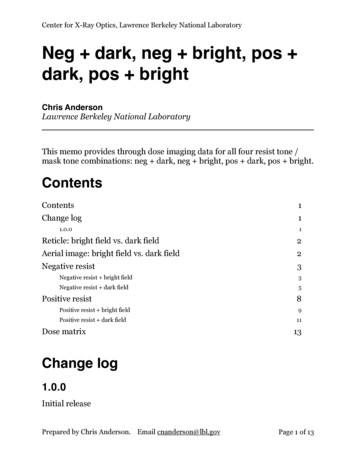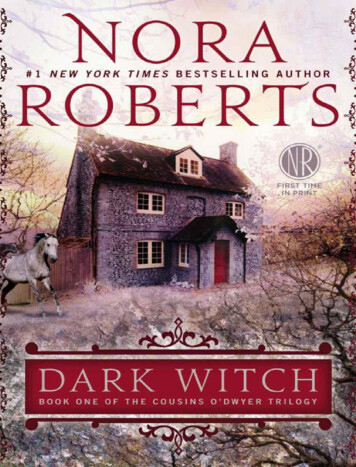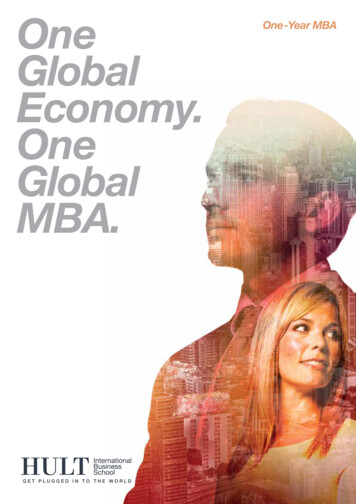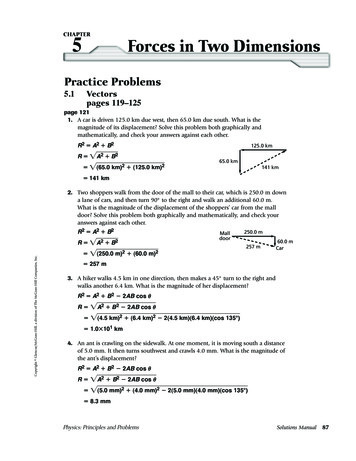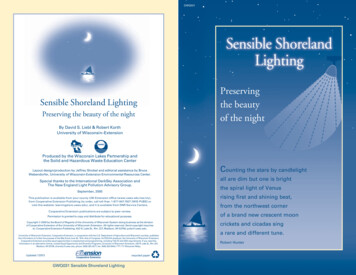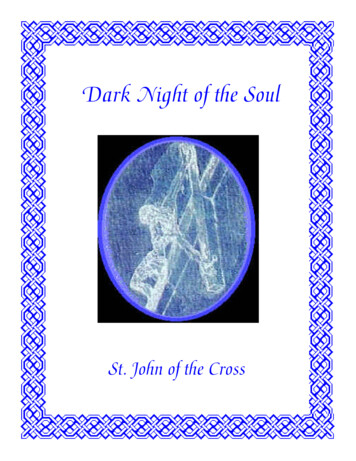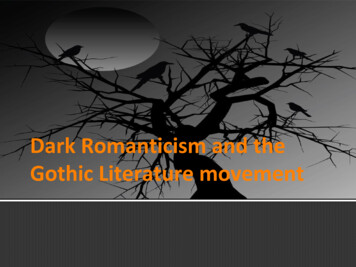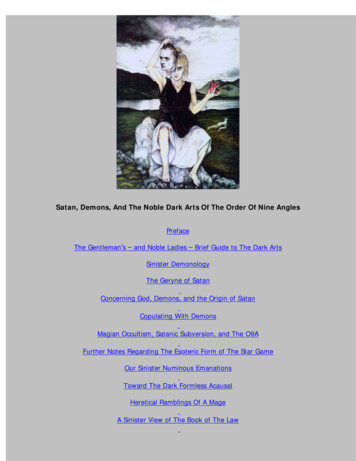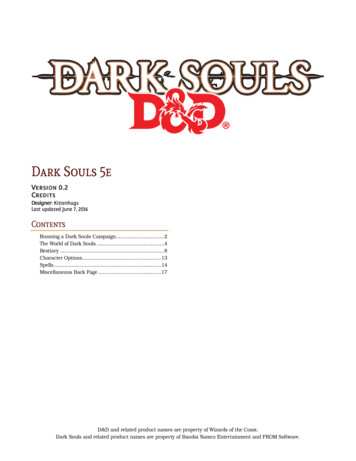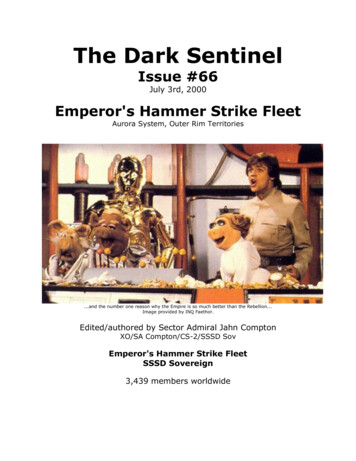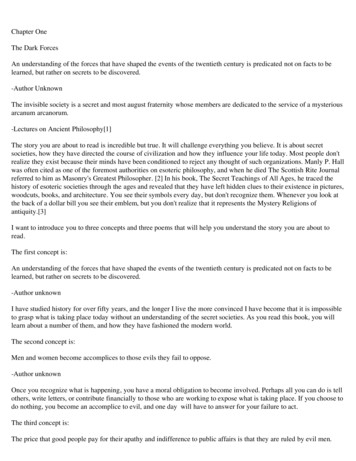
Transcription
Chapter OneThe Dark ForcesAn understanding of the forces that have shaped the events of the twentieth century is predicated not on facts to belearned, but rather on secrets to be discovered.-Author UnknownThe invisible society is a secret and most august fraternity whose members are dedicated to the service of a mysteriousarcanum arcanorum.-Lectures on Ancient Philosophy[1]The story you are about to read is incredible but true. It will challenge everything you believe. It is about secretsocieties, how they have directed the course of civilization and how they influence your life today. Most people don'trealize they exist because their minds have been conditioned to reject any thought of such organizations. Manly P. Hallwas often cited as one of the foremost authorities on esoteric philosophy, and when he died The Scottish Rite Journalreferred to him as Masonry's Greatest Philosopher. [2] In his book, The Secret Teachings of All Ages, he traced thehistory of esoteric societies through the ages and revealed that they have left hidden clues to their existence in pictures,woodcuts, books, and architecture. You see their symbols every day, but don't recognize them. Whenever you look atthe back of a dollar bill you see their emblem, but you don't realize that it represents the Mystery Religions ofantiquity.[3]I want to introduce you to three concepts and three poems that will help you understand the story you are about toread.The first concept is:An understanding of the forces that have shaped the events of the twentieth century is predicated not on facts to belearned, but rather on secrets to be discovered.-Author unknownI have studied history for over fifty years, and the longer I live the more convinced I have become that it is impossibleto grasp what is taking place today without an understanding of the secret societies. As you read this book, you willlearn about a number of them, and how they have fashioned the modern world.The second concept is:Men and women become accomplices to those evils they fail to oppose.-Author unknownOnce you recognize what is happening, you have a moral obligation to become involved. Perhaps all you can do is tellothers, write letters, or contribute financially to those who are working to expose what is taking place. If you choose todo nothing, you become an accomplice to evil, and one day will have to answer for your failure to act.The third concept is:The price that good people pay for their apathy and indifference to public affairs is that they are ruled by evil men.
-Author unknownOnly half of evangelical Christians are registered to vote, and only half of those registered actually do vote. We mustconvince everyone they have a moral obligation to become involved in the political process, ensure honest elections,and insist that elected representatives obey the Constitution. Unless enough people are willing to take action, we willsurely lose our freedom.Each of the following poems reflects an aspect of the spiritual struggle that is taking place.The first poem was written in 1842 by Alfred Lord Tennyson. It is often quoted by those who advocate worldfederation.The second poem was written in 1902 by Rudyard Kipling to honor the man who is responsible for many of our currentproblems.The third poem was written before the Civil War by James Russell Lowell.I will address each poem in turn.When I mention Alfred Lord Tennyson, most people remember his poem, The Charge of the Light Brigade.Half a league, half a league,Half a league onward,All in the valley of DeathRode the six hundred.Forward, the Light Brigade!Charge for the guns! he said:Into the valley of DeathRode the six hundred.Forward, the light Brigade!Was there a man dismayed?Not tho' the soldiers knewSomeone had blundered:Theirs not to make reply,Theirs not to reason why,Theirs but to do and die:
Into the valley of DeathRode the six hundred.Cannon to the right of them,Cannon to the left of them,Cannon in front of themVolley'd and thunder'd;Storm'd at with shot and shell,Boldly they rode and well,Into the jaws of Death,Into the mouth of hellRode the six hundred.Flash'd all their sabres bare,Flash'd as they turned in airSab'ring the gunners there,Charging an army, whileAll the world wondered.Plunged in the battery-smoke,Right through the line they broke;Cossack and RussianReel'd from the sabre-strokeShattered and sundered.Then they rode back, but not -Not the six hundred.Cannon to the right of them,Cannon to the left of them,Cannon behind them
Volleyed and thundered;Stormed at with shot and shell,While horse and hero fell,They that had fought so wellCame thro' the jaws of Death,Back from the mouth of Hell,All that was left of them,Left of six hundred.When can their glory fade?Oh, the wild charge they made!All the world wondered.Honor the charge they made!Honor the Light Brigade,Noble Six Hundred!These were memorable verses, but most people have never heard of Lord Tennyson's most important poem LocksleyHall. He wrote it to popularize his belief that Great Britain had a moral obligation to consolidate the world underBritish rule. I suspect that he had no idea his poem would have a lasting impact, or that it would be responsible formany of the tragic events of the twentieth century. I also suspect that he had no concept of the true nature of the darkspiritual forces he had engaged, or how those forces influenced his view of the world. [4]The Poem Locksley Hall is discussed in volume 17 of the 1966 edition of the Encyclopedia Americana. The remainderof Lord Tennyson's poetry, and his biography, are covered in volume 26. Why is that important? Because those whowork within the shadows understand the significance of the message contained in Locksley Hall, and felt it should becovered separately. The author who wrote the analysis of Locksley Hall in volume 17 noted that it prophesieduniversal peace by means of a league of nations. That has been the goal of the arcane societies since the dawn ofcivilization, and it remains their objective today. [5]I will quote only the most important sections of Locksley Hall :For I dipt into the future,far as human eye could see,Saw the Vision of the world,and all the wonder that would be;
Heard the heavens fill with shouting,and there rain'd a ghastly dewFrom the nations' airy naviesgrappling in the central blue;Till the war-drum throbb'd no longer,and the battle-flags were furl'dIn the Parliament of man,the Federation of the world.There the common sense of mostshall hold a fretful realm in awe,And the kindly earth shall slumber,lapt in universal law. [6]Thirty years after Lord Tennyson penned those words, Professor John Ruskin, who taught at Oxford University,embraced Tennyson's vision. John Ruskin was a charismatic teacher who had the ability to project his concepts intothe minds of his students. He used his lectures to convince his students that they had a moral obligation to disseminateEnglish culture and unite the world under British rule.[7] Many of the young men who sat in his classes wereenthralled by his ideas, and they dedicated their lives to fulfilling his dream, When they graduated, many of thementered government service, and by the early 1900s they held strategic positions in the English government. They werethe men who were responsible for creating, and then prolonging, World War I. Why would rational men want a longand bloody conflict? Because they realized that countries would never relinquish their national sovereignty unless theyrecognized the futility of war, and World War I convinced most people that war was futile. Over twenty million peopleperished in that senseless carnage. Repeated efforts to end the conflict were blocked, and when the war finally ended,most people and most nations were ready to cede their sovereignty to the League of Nations. I will develop thatconcept further in chapter four when I discuss Winston Churchill and the part he played in determining militarystrategy in both World War I and World War II.[8]Other people embraced Lord Tennyson's vision. Edward Bellamy wrote Looking Backward: 2000-1887 in 1888, andhe advocated socialism and world government. His story began in Boston in 1887 when a young man fell asleep aftertaking a sleeping potion and awoke in the year 2000 to find the world transformed into a socialist Utopia. Bellamydescribed the world he envisioned with the advent of the new millennium, and his predictions were truly remarkablewhen you consider that he lived over a hundred years ago. He wrote:An American credit card . . . is just as good in Europe as American gold used to be, and on precisely the samecondition, namely, that it be exchanged into the currency of the country you are traveling in. An American in Berlintakes his credit card to the local office of the international council . . . the amount being charged against the UnitedStates in favor of Germany on the international account. [9]
How could Edward Bellamy have foreseen what is taking place today? Was he privy to some source of secretknowledge? He foresaw large corporations taken over by larger corporations until finally all commerce was mergedinto a single corporation, The Great Trust.The nation . . . organized as the one great business corporation in which all other corporations were absorbed; itbecame the one capitalist in the place of all other capitalists, the sole employer, the final monopoly in which allprevious and lesser monopolies were swallowed up, a monopoly in the profits and economies of which all citizensshared. The epoch of trusts had ended in The Great Trust. [10]Edward Bellamy foresaw what is taking place in communist China where all Chinese corporations are answerable tothe state. He described the social welfare programs that exist in the United States today, and he envisioned the comingworld government when he wrote:. I, who, having beheld in a vision the world I looked on, sang of it in words that again and again, during these lastwondrous days, had rung in my mind: -For I dipt into the future, far as human eye could see,Saw the vision of the world, and all the wonder that would be;Till the war-drum throbb'd no longer, And the battle flags were furled.In the Parliament of man, the federation of the world.Then the common sense of most shall hold a fretful realm in awe, And the kindly earth shall slumber, lapt in universallaw. [11]Shortly after his book was published, Bellamy Clubs began forming across the United States. As the movement forsocialism and world government spread, a number of wealthy men embraced Bellamy's concepts. Among them wasAndrew Carnegie. Most people think of him as a robber baron, an example of everything wrong with the freeenterprise system. That view is incorrect. Andrew Carnegie didn't believe in free enterprise. He believed in monopolycapitalism which allows those of great wealth to use government to exploit others. Andrew Carnegie was a socialist,but the socialism he envisioned created a ruling class. After selling U.S. Steel [Carnegie Steel, which he sold to J.P.Morgan who formed U.S. Steel], he funded several foundations with instructions that their grant-making power was tobe used to transform society and promote world government. Why did Andrew Carnegie support those goals? Becausehe recognized that socialism is a sincere, benevolent, idealistic theory, but it doesn't work without force. Undersocialism the government takes from each according to their ability and gives to others according to their need.Everyone is controlled by the government; the government is controlled by politicians, and politicians are bought andsold by wealthy men and corporations. That is why Andrew Carnegie, and other men of great wealth, favorsocialism.[12]Andrew Carnegie embraced Lord Tennyson's vision in 1893 in his book Triumphant Democracy, when he wrote:The Parliament of Man and the Federation of the World have already been hailed by the poet, and these mean a stepmuch farther in advance of the proposed reunion of Britain and America . I say that as surely as the sun in theheavens once shown upon Britain and America united, so surely is it one morning to rise, shine upon, and greet againthe reunited state, 'The British-American Union.' [13]
One hundred years later, Arthur Schlesinger, Jr. wrote an article that appeared on the editorial page of the Wall StreetJournal. In October 1993 many people were concerned because we seemed to be relinquishing our nationalsovereignty, and moving toward world government and a New World Order. Arthur Schlesinger, Jr. addressed thatconcern:The world of law will not be attained by exhortation . Let us not kid ourselves that we can have a new world orderwithout paying for it in blood as well as in money. Maybe the costs of enforcement are too great. National interestnarrowly construed may well be the safer rule. But let us recognize that we are surrendering a noble dream. Rememberthose lines of Tennyson that Churchill called 'the most wonderful of modern prophesies' and that Harry Trumancarried in his wallet throughout his life:For I dipt into the future, far as human eye could see,Saw the Vision of the world, and all the wonder that would be.Heard the heavens fill with shouting, and there rain'd a ghastly dewFrom the nations' airy navies grappling in the central blue. . .Till the war-drum throbb'd no longer, and the battle flags were furl'dIn the Parliament of Man, the Federation of the World. [14]Here Arthur Schlesinger, Jr. revealed the little-known fact that both Winston Churchill and Harry Truman werededicated to world government. Did Winston Churchill really want Great Britain to surrender its national sovereignty?Why did Harry Truman carry Lord Tennyson's poem in his wallet throughout his life? Is it possible that both men weremembers of the arcane societies?Most people have forgotten the strange things that happened during Harry Truman's presidency. First, he signed theUnited Nations Charter, knowing
-Author unknown Only half of evangelical Christians are registered to vote, and only half of those registered actually do vote. We must convince everyone they have a moral obligation to become involved in the political process, ensure honest elections,
